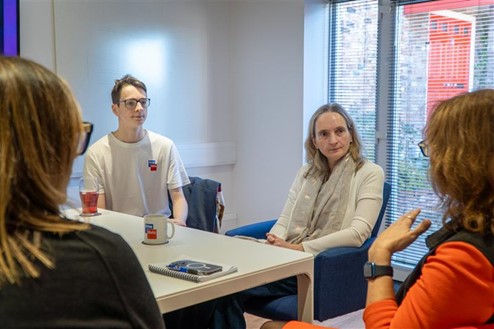
Exploring the reasons behind this, the report revealed some outdated perspectives held by students. Nearly 39% believe that a university degree has a more esteemed reputation than an apprenticeship, with 1 in 10 saying that their parents disapproved of the apprenticeship route.
One of the main barriers to apprenticeship uptake in the UK is parents, who play a pivotal role in shaping the career decisions of their children. The 2023 Success at School Parents Survey looked at apprenticeships from a parental perspective. Only 13% of surveyed parents view apprenticeships as a viable opportunity, while 8% doubt that an apprenticeship can lead to jobs requiring a bachelor's degree.
A critical finding of the survey was that almost half of the parents surveyed were unaware of the existence of degree apprenticeships, with 20% of respondents assuming degree apprentices must contribute financially themselves.
DriveWorks employs a degree apprentice, Joseph Chadwick, who is studying a BSc degree apprenticeship in Digital & Technology Solutions at Manchester Metropolitan University (MMU). Joseph combines working in the Development team at DriveWorks with one day each week spent in lectures at MMU.
We spoke with Joseph and his Mum to get their take on degree apprenticeships.
Joseph Chadwick, Degree Apprentice, DriveWorks

From a student’s perspective:
I’ve always been interested in computers and knew that I wanted to be a programmer. I’d already done a summer work experience placement at DriveWorks while I was at Priestley College. From that, I could see how important work experience was and I really enjoyed learning that way. My Mum had heard about degree apprenticeships, and she told me about them. I had an offer to study Computer Science at Newcastle University, but I decided that a degree apprenticeship was the best route for me. It gives me the opportunity to get work experience, earn a wage, get a degree, and not have to pay any university course fees.
On his degree apprenticeship at DriveWorks:
I'm getting to apply the experience I gained from programming games as a hobby to develop professional software for real-world design automation solutions. Because DriveWorks has a graduate scheme, there are other students working in the business too. I get the best of both worlds as I’m meeting new people at work and at university and because I’m earning my own money, I can do social stuff with both groups.
I like the DriveWorks products and the technology, I like the people and I like the coffee!
Gill Chadwick, Parent
From a parent’s perspective:

Joseph has always been an independent learner and we really noticed that when it came to homeschooling during lockdown.
I can’t remember where I first heard about degree apprenticeships, it may have been from a maths programme that Joseph took part in when he was in Year 9. There wasn’t a huge amount of information readily available, and I had to do a lot of online research myself to find out more. I was motivated to do that but I appreciate that not all parents might have the time to help with it.
I’ve had a mixed response from other parents when they hear that Joseph is doing a degree apprenticeship. There’s still a view that the traditional university degree route is somehow superior to a degree apprenticeship. Parent posturing definitely comes into play sometimes. Some think that it’s only an option for people whose parents have their own business (or know someone who has a business) where they can do that. There’s clearly a lot of miseducation around.
I think that Joseph has the best of both worlds doing a degree apprenticeship. He’s clearly enjoying what he’s doing and he’s coming home in the evening and sharing that with us. He enjoys being part of a team at work and the benefits that brings. He’s certainly not missing out on the social aspect that some parents think is part and parcel of a traditional university education. He has a great social life and often visits old school friends who are away at university at the weekends.
Maria Sarkar, Co-Founder, DriveWorks

From an employer’s perspective:
DriveWorks has a long history of supporting young people.
We consider it to be part of our DNA and we’re pleased to be able to take on the role of an “employer influencer”. Our support for young people covers:
- introducing careers into STEM subjects at school
- work experience placements for Year 10 & 11 students
- a successful university placement programme for students in their 3rd year at university
- delivering guest university lectures on careers in engineering and computing
- a certification programme for students to learn about automation
For us degree apprenticeships are a win-win. There’s obviously a funding benefit element to it, but it’s so much more than that. We’re creating a pipeline for talent by recruiting high-calibre future managers who are more likely to want to stay with DriveWorks after they’ve graduated. As Joseph progresses with his degree course he’ll be able to share fresh ideas and new ways of thinking with his DriveWorks colleagues. And in terms of positive impact on the wider team, we’ve already seen a “halo effect” in the development of other team members who are working alongside him.
The Outlook
In many countries across Europe, apprenticeships are seen as an integral part of employer recruitment strategies and a key bridge into the workplace for school leavers.
Austria and Germany are great examples of apprenticeship schemes working well. Their apprenticeship models are well integrated into education systems and businesses and are highly respected by students, parents, and employers. In Germany, nearly 60% of school leavers successfully complete an apprenticeship, and in Austria, 40% of 15-16 year olds take part in an apprenticeship programme. Both countries have low youth unemployment rates.
The UK apprenticeship model isn’t necessarily inferior to other European countries, however, the perception that apprenticeships are a second rate option compared to university education is a key issue that continues to hinder their uptake and adoption.
For apprenticeship programmes to succeed in the UK, we need to change the attitudes around them. We need to change the narrative and challenge the misconceptions around them. Changing the perceptions of young people, and the parents who influence them, could be the key to changing attitudes and breaking down the apprenticeship stigma.
For more information on degree apprenticeships we suggest the following resources:
For young people:
Apprenticeships in Cheshire and Warrington (candwopportunities.co.uk)
For employers: www.gov.uk/employing-an-apprentice
